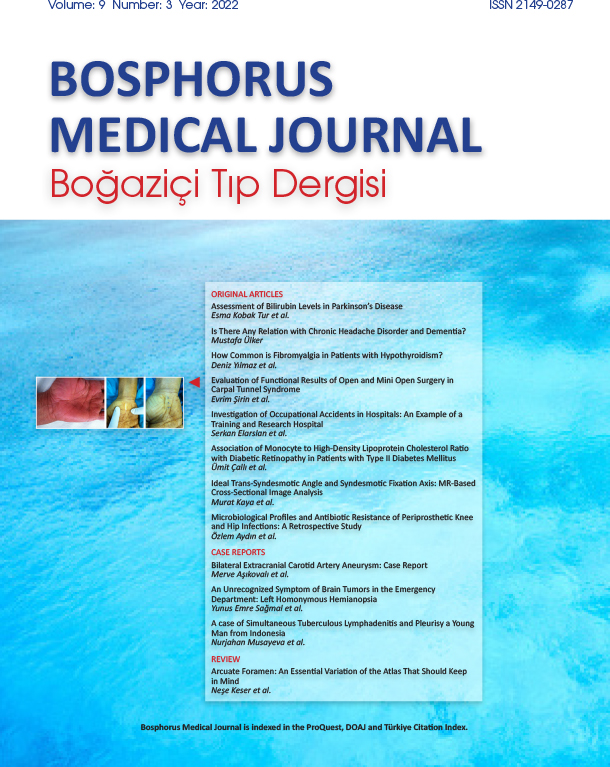Evre 4 Küçük Hücreli Dışı Akciğer Kanserinde PD-L1 Ekspresyonunun Prognostik Önemi
Pelin Korkmaz1, Şeyma Özden2, Murat Kıyık31İstanbul Üniversitesi, İstanbul Tıp Fakültesi, Alerji ve İmmünoloji Anabilim Dalı, İstanbul, Türkiye2Sağlık Bilimleri Üniversitesi Süreyyapaşa Göğüs Hastalıkları ve Göğüs Cerrahisi Eğitim ve Araştırma Hastanesi, İmmünoloji ve Alerji Kliniği, İstanbul, Türkiye
3Sağlık Bilimleri Üniversitesi Yedikule Göğüs Hastalıkları ve Göğüs Cerrahisi Eğitim ve Araştırma Hastanesi, Göğüs Hastalıkları Kliniği, İstanbul, Türkiye
GİRİŞ ve AMAÇ: Akciğer kanserinin dünyadaki en ölümcül kanser olması nedeniyle immün kontrol noktaları ve bu noktaları etkileyen moleküllerle ilgili gelişmeler artmıştır. PD-1/PD-L1 immün kontrol noktasını etkileyen immünoterapi tedavilerinin prognoz üzerindeki olumlu etkileri bu immün kontrol noktalarına dikkat çekmiştir. PD-1 yolu için geliştirilen immünoterapi çalışmaları hızla devam ederken, bu çalışmanın amacı PD-L1 düzeyi, immünoterapiden bağımsız olarak küçük hücreli dışı akciğer kanserinde prognostik bir belirteç olarak kullanılıp kullanılamayacağını öngörmektir.
YÖNTEM ve GEREÇLER: 01 Ocak 2016-01 Ocak 2018 tarihleri arasında merkezimize başvuran ve küçük hücreli dışı akciğer kanseri tanısı konulan 115 hasta retrospektif olarak incelendi. Tüm hastaların dosyaları detaylı bir şekilde tarandı ve patolojik verileri doğrulandı. Çalışmaya dahil edilen hastaların demografik verileri, patolojik tanı yöntemleri, hastalığa ilişkin tedavi bilgileri ve hastaların geçmiş tıbbi öyküleri hastane veri tabanı referans alınarak kaydedildi.
BULGULAR: PD-L1 <%50 olan hastalar negatif grup, PD-L1 değeri %50 ve üstü olan grup pozitif grup olarak kabul edildi. Negatif grupta 27, pozitif grupta 11 hasta vardı. Yirmi yedi negatif grup hastasının 21'inin (%67,8) ve 11 pozitif grup hastasının 3'ünün (%21,3) öldüğü belirlendi. Toplam 38 hastanın 24'ünün (%73,2) öldüğü belirlendi. Negatif grupta ortalama sağkalım 10,81 ay iken, pozitif grupta ortalama sağkalım 28,54 aydı. Pozitif grupta ortalama sağkalım istatistiksel olarak anlamlıydı (p=0,046).
TARTIŞMA ve SONUÇ: PD-L1 ekspresyonunun evre 4 küçük hücreli dışı akciğer kanserinde pozitif bir prediktif değer olduğu bulundu. Çalışmamız EGFR, ALK ve ROS mutasyonlarını dışlaması ile diğer çalışmalardan ayrılmaktadır. PD-L1'in prognoz ile ilişkisini daha net belirleyebilmek için daha geniş hasta grupları ile hedef mutasyonları dışlayan, immünoterapi ve hedefe yönelik tedavilerden bağımsız randomize, prospektif çalışmalara ihtiyaç vardır.
Prognostic Significance of PD-L1 Expression in Stage 4 Non-Small-Cell Lung Cancer
Pelin Korkmaz1, Şeyma Özden2, Murat Kıyık31Department of Allergy and Immunology, Istanbul University, Istanbul Faculty of Medicine, Istanbul, Türkiye2Department of Immunology and Allergy, Health Sciences University Sureyyapasa Chest Diseases and Thoracic Surgery Training and Research Hospital, Istanbul, Türkiye
3Department of Chest Diseases, Health Sciences University Yedikule Chest Diseases and Thoracic Surgery Training and Research Hospital, Istanbul, Türkiye
INTRODUCTION: Since lung cancer is the most deadly cancer in the world, developments regarding immune control points and molecules affecting these points have increased. The positive effects of immunotherapy treatments affecting the PD-1/programmed death receptor ligand-1(PD-L1) immune checkpoint on prognosis have drawn attention to these immunocheckpoints. While immunotherapy studies developed for the PD-1 pathway continue rapidly, the aim of this study is to investigate whether PD-L1 level can be used as a prognostic marker in non-small-cell lung cancer independent of immunotherapy.
METHODS: 115 patients admitted to our center between January 01, 2016, and January 01, 2018 and diagnosed with non-small-cell lung cancer were retrospectively analyzed. The files of all patients were scanned in detail and their pathological data were confirmed. Demographic data of the patients included in the study, pathological diagnosis methods, treatment information about the disease, and past medical histories of the patients were recorded with reference to the hospital database.
RESULTS: The patients with PD-L1 <50% were considered the negative group (NG), and the group with a PD-L1 value of 50% or more was considered the positive group (PG). There were 27 patients in the NG and 11 patients in the PG. It was determined that 21 (67.8%) of 27 NG patients and 3 (21.3%) of 11 PG patients died. In total, 24 (73.2%) of 38 patients were found to have died. While the mean survival in the NG was 10.81 months, the mean survival in the PG was 28.54 months. Mean survival in the PG was statistically significant (p=0.046).
DISCUSSION AND CONCLUSION: PD-L1 expression was found to be a positive predictive value in Stage 4 non-small-cell lung cancer. Our study differs from other studies in that it excluded epidermal growth factor receptor, anaplastic lymphoma kinase, and ROS mutations. To determine the relationship of PD-L1 with prognosis more clearly, there is a need for randomized, prospective studies with larger patient groups that exclude target mutations and are independent of immunotherapy and targeted therapies.
Makale Dili: İngilizce




















